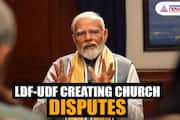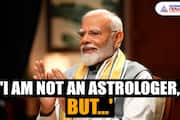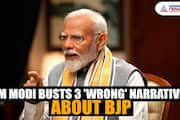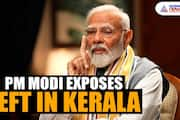Lalu to DKS: BJP's 'Anti corruption' is the new social justice

The recent CBI raids on Laloo Yadav, DV Shivakumar and others have led to the usual howls of 'vendetta' from the opposition. They are dead wrong. The huge mandate that the BJP got in 2014 and later in UP in 2017, came with the expectation from voters of a crackdown on graft.
Narendra Modi has placed himself as a leader with a clean image and no family loyalties. His political capital from the time he campaigned has been invested in the promise of a strong anti-corruption crackdown. The voters have kept the faith, despite rhetorical shortcomings - such as a promise of bringing thousands into bank accounts from money illegally stashed abroad.
It is this faith by the voter that allowed Modi to articulate the Richter scale shattering demonetization policy in clear anti corruption terms. A policy that influenced the very poorest and deprived many in the lower strata of job opportunities while also causing massive inconvenience was still a hit.
The reason is simple. Indians saw in it a surgical strike against undeclared wealth, which when taxed, will add to the national income and bring the corrupt to account.
Narendra Modi has understood a structural change in Indian Polity. Economic well being is becoming a central electoral demand, displacing social empowerment for the middle strata of Indians. The Dalits and tribal groups still view social mobility and political power as their guiding force. In the $2 trillion economies, monetary well being is moving up as a priority for the rest.
The family and individual dominated parties like the Congress, and the RJD have been oblivious to this massive shift. Upcoming state elections in Himachal Pradesh and Karnataka are going to be fought around the anti-corruption pivot – winners in both states could well set the tone.
Some of this was already becoming clear even before Modi came to power. Various opinion polls have lately brought fighting corruption as a core concern for the Indian electorate. In 2014 a major survey by Gallop, the polling firm, 90 per cent of North Indians and 65 per cent of South Indians identified corruption as both wide spread, and its elimination as a voting issue.
A double edged sword
Taking the high moral ground on corruption is not without risk for Narendra Modi. One out standing feature of his current tenure has been an absence of big corruption at the cabinet level. Coming as this did after a Congress government where billion-dollar graft scams were almost weekly affairs - this is a significant achievement.
However as BJP consolidates power and without any visible electoral reforms - the party will need money. Individual dishonesty too cannot be ruled out. For Modi, a corrupt minister - should one be discovered in the future - will, in fact, be an opportunity. If he acts fast and dismisses the corrupt, it will make him stronger than the party. Given his positioning as being above corruption and his status as the prime vote winner this should not be very difficult.
A favourite game in New Delhi is guessing the unpredictable Modi's next big move. It could well be an ultra tough anti-corruption law. Should it come, it would be very popular. Its implementation could change the punishment for graft in India. The voters will love it.
















